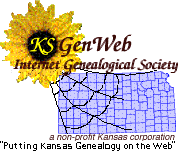 |
 EARLY PIONEERS |
 |
 |
 EARLY PIONEERS |
 |
Lester Ray and Octa May Worcester - No. 1289 The following material is quoted verbatim from a pamphlet entitled "123 Years With the Descendants of Lester Ray and Octa May Worcester." The pamphlet sets forth the family history of Lester and Octa along with many of their descendants. The pamphlet was provided by Merlyn Worcester of Hill City, Kansas. The author of the pamphlet is unknown.Lester Ray Worcester and Octa May Bird were pioneers in Graham County. Both crossed the plains of the Midwest in covered wagons, arriving in Graham County during the same year. Lester was born in Brodhead, Wisconsin and had a twin sister. His parents, Leverett Downs and Rozanne Woodard Worcester, along with four sisters and one brother, arrived in the county in 1879. They settled Northeast of Hill City in the Spring Creek area. The trip to Kansas from DeKalb County, Mo. lasted three weeks, arriving in Graham County on the 8th day of March, 1879. Graham County as such was not organized into a county until April 1, 1880.
Lester and Octa May were married in Guy, Kansas. The town of Guy was located a few miles east of the county seat of Hoxie. It no longer is in existence. John and Rachel Bird's house was located about two miles southwest of what was later known as Tasco. likewise no longer exists.
They built a sod house on homesteaded land. It was built on a cement foundation three feet wide. The slabs of sod about four inches thick, approximately eighteen inches wide and two feet long were placed grass side down in a cris-cross manner. A hand dug well lined with native rock was located a few yards behind the house.
A.D. Worcester, a grandson of John and Rachel, tells of being at the sod house and Grandma had just baked some pumpkin pies. She put them outside on the ground to cool and a drake duck walked through them. He quacked and all the other ducks followed suit, walking through the hot pies. Within three years after John and Rachel moved to Sheridan County, all their children were married except Lillie and she was teaching school.
May and Lester grew up on the prairie. Many were the stories they told of living of pioneer living. Of wearing gunny sacks bound to their feet and putting shoes and socks on just before entering school and church. They told of prairie fires sweeping across the open plains with nothing to stop them. Also of rolling hoop snakes, of gathering cow chips for fuel, of summer heat and winter cold but always enough to eat and plenty of love and laughter.
The houses they lived in had dirt floors. Gunny sacks for carpeting and Muslims for windows. Both attended country normal school and prepared themselves for teaching. Both held positions for several years. They were charter members of the First Christian Church of Hill City, driving 12 miles each way in a spring wagon on Sunday to attend services.
The family moved into town in Hill City in 1910. Soon after they located on the family place southeast of town on a ten acre site. Lester became a rural mail carrier on a route south of town. In addition to delivering mail, he also delivered thread, groceries, medicine and good will all along his route. At one time, he had the largest orchard in Northwestern Kansas. If it could be grown in the area, (apple trees, peaches, apricots, berries, melons, garden vegetables) he had it growing on his place. Not being a selfish man, he furnished fruit and vegetables to anyone who cared to stop by the home place --- without charge. His delight in giving his products away was a bright, cheerful smile -- and he always had plenty for canning purposes to carry his family through the winter months. The storm cellar was filled to capacity every fall. May Worcester raised her own chickens for eating and for eggs for the family as well as "pin money."
Anyone passing through the town without a place to stay was always welcome in the Worcester household. During the dust storms of the early 1930's, one never knew how many visitors or family members would come in from the country to find refuge in the Worcester home. On one occasion, a passing motorist had been involved in an accident and was confined to a hotel room. May heard about the accident and had the victim removed to her home to take care of the patient for three weeks while bones mended. The patient was a front room guest in the Worcester home. May and Lester were very religious people and practically kept the church alive themselves -- both financially and spiritually. Lester took his Noah's Ark complete with animal cookies to any country church needing to conduct Sunday services at any time he was called was heard to remark: "If I could have my heart's desire, it would not be wealth or fame, but to know God's book of memory."
The question arises about why a man and his wife who own their farm in Missouri, pick up the family and move westward? The weather being what it is, why would they travel 300 to 400 miles by horse and wagon? Here's one logical answer: John served in the Civil War. He had a family of seven children, three boys nearly grown. Out west land was free. There were 160 acres for planting a tree claim. Where else could a man offer so much for his sons and daughters? His parents and grandparents had moved from Pennsylvania to Virginia and Ohio. Rachel's family moved from Boston to West Virginia to Ohio. They were what we call pioneer blood, and as such, new horizons and the unknown must have held a challenge for them. Why would they leave in February? Crops need to be planted in the spring. A new home had to be built from material that was available -- sod, rock and timber. Perhaps this was one of the mild winters, sometimes we have nice weather in February.
Octa May Worcester was born on May 24, 1874. She came to Hill City at the age of 4 was and settled northeast of town. As a child, she did a lot of sheep herding for her family and they had a huge sheep shed which covered over an acre of land.
Each person had their doors that they were responsible for and they could nail them shut if the Indians bothered them. They were always ready, but "as long as they left the Indians alone, the Indians wouldn't bother them." While the Indian scares were numerous, all they usually wanted was food and would leave after they got it.
Before she died, Octa May recalled that she was quite a wanderer and that she continued her schooling in Great Bend before teaching school. When she married Lester in 1892, he continued teaching and she stayed home and farmed. She "snapped corn and fed hogs and cattle." They kept cactus around the windows to keep rattlesnakes out because they had no window screens. She also remembered that they had more trouble with fleas than with flies in their homes. Coyotes and rattlesnakes offered problems as did horse thieves and bandits passing through. The weather caused its share of the difficulties in early-day Graham County as a flash flood once roared down Spring Creek taking out a picket fence near Octa May's home. It was bad enough to lose the fence but even worse to lose the half dozen head of cows to the fence.
One particular prairie fire burned form northeast of their place down through Nicodemus, but the Indians kept the prairies pretty well burned off for their own protection so there weren't too many unplanned fires. Caves were often used as refuges from storms and they were always well equipped. The Worcester's like other early settlers, would take a load of wheat to town in the fall and sell it to by their supplies for winter and would take another load in the spring to carry them through until the next crop.
They would spend $10-15 for several months' supplies and lived off of mush, milk and hash. Three or four hogs would be butchered at the time and the pork was stored in brine and the sausage in lard and kept in the cave. They made their own butter and cheese and cooled it in the spring near the house.
On their 50th wedding anniversary, Lester's twin-sister (Mrs. Frank Blackburn) was in attendance as was her husband. They were the young couple's attendants at their wedding 50 years earlier. The following bit of wisdom might well be the philosophy of Lester and Octa May Worcester: "We may not leave our children a great inheritance, but day by day, we are weaving them a coat to wear through eternity."